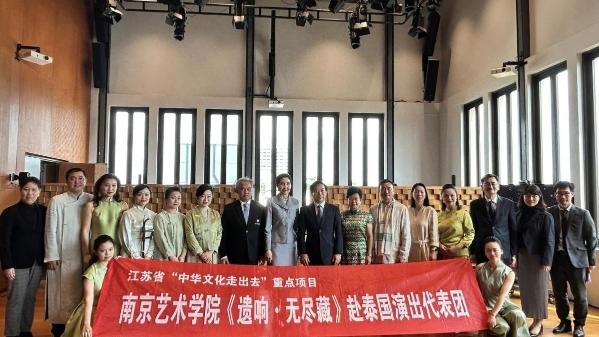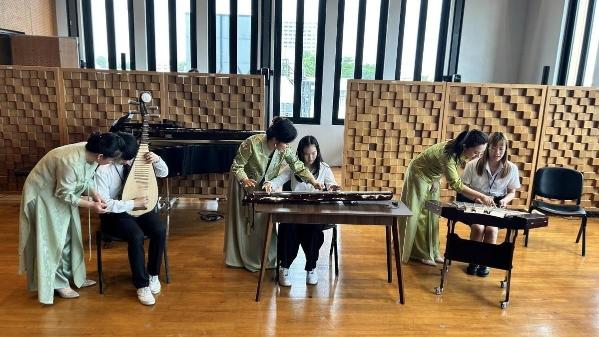
A concert promoting traditional Chinese instrumental music and appeal of intangible cultural heritage in Chinese classical music is held at Princess GalyaniVadhana Institute of Music in Bangkok on
In a rare concert, a traditional Chinese musical instrument erhu releases sentimental chants to the tidal companion of piano notes, touching nerves of audience.
For the first time ever outside China, a program titled The Moon Sets below the River---duo by erhu and piano ranging from ancient time up to present, was performed on Friday in Bangkok, said Wang Xiaojun, dean of the School of Music at Nanjing University of the Arts.
Wang and other artists shone at a concert of traditional Chinese instrumental music and appeal of intangible cultural heritage in Chinese classical music held at Princess GalyaniVadhana Institute of Music.
Artists from the School of Music at Nanjing University of the Arts performed a total of nine repertoires with various traditional Chinese instruments, including bamboo flute, Chinese zither, erhu, pipaand yangqin.
"Thailand and China shares a lot of common in music with some of the instruments even functioning the same. The rhythm of traditional Thai music also enjoys lots of similarities with that in South China's Fujian province," Wang said.
He said the concert also provides Thai people with a chance of learning and a touch of some instruments among the representative list of UNESCO's intangible cultural heritage of humanity, such as the Chinese zither, or guqin, which has existed for more than 3,000 years and represents China's foremost solo musical instrument tradition.
"Also, the piece The Moon Sets below the River has drew inspiration from the Qinhuai Lantern Festival, which is included in the first batch of China's national intangible cultural heritage list as a folk event popular in Nanjing, capital of Jiangsu province," Wang explained.
"The music describes the reflections of the moon and stars in the water merging gradually with the lantern light. Listeners will fall into meditation over the unity of the past and the present and the unity of man and nature," he added.

A pipa, Chinese zither and a yangqin, are presented by the School of Music with Nanjing University of the Arts as gifts to the Princess GalyaniVadhana Institute of Music on Friday. [Photo/China Daily]
Former Thai prime minister Prayut Chan-o-cha's spouse Naraporn Chan-ocha, Chinese Ambassador Han Zhiqiang and his spouse Wang Huan attended the event.
Naraporn applauded the performances and expressed her appreciation on traditional Chinese instrumental music and the efforts of those artists on promoting cultural exchanges between Thailand and China.
Ambassador Han spoke highly of Princess Galyani's initiative to establish this art education institute to cultivate advanced professional music talents, and lauded Naraporn's efforts to promote the cooperation between the institute and Chinese colleges and universities.
"There is no boundary for music. Every country has its own language, but only the music language is interlinked. Hope music will serve as a bridge and connect people from the two countries further," Han said.
After the concert, Wang presented three traditional Chinese instruments as gifts to the Princess GalyaniVadhana Institute of Music, encouraging local Thai students to learn Chinese instrument and music in future.




